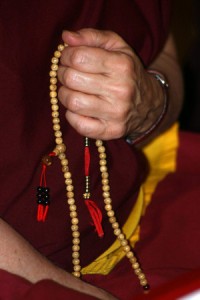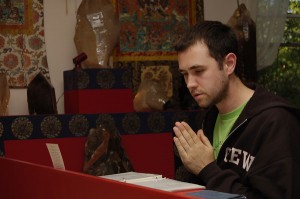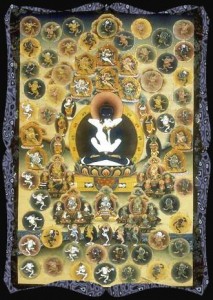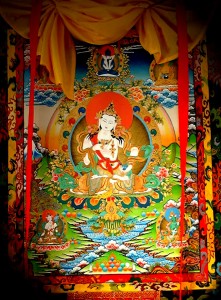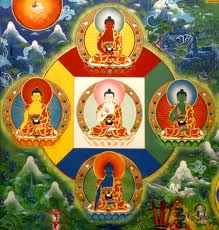The following is an excerpt from a teaching by Jetsunma Ahkon Lhamo offered during a Phowa retreat:
Last time I saw you guys you were dead; and the Buddhas appeared to you, and you were still dead. We spoke last about the section of the bardo where the Buddhas and the Bodhisattvas appear, and we spoke of the forty-two peaceful deities and the fifty-eight wrathful deities. I explained yesterday that on the appearance of the peaceful deities, one should understand, first of all, that one is unfamiliar with that. Remember, to understand in terms of Vajrayana why we act the way we do and how we should practice, we have to understand what an important part habitual tendency takes. Remember, when the Buddhas appear to us, the peaceful Buddhas that is, in the bardo state, they appear to us with extraordinarily brilliant lights. I have explained to you that in that state of the bardo those lights may even be so impactful that they will also impact the other senses—like a light so bright that you can almost hear it, if you can imagine such a thing. I actually had an experience like that. I once had a pulse of light flash to me from one of those newfangled flashlights that have big halogen bulbs in them. You’re not supposed to look at them. If you look at them, they will damage your eyes. You can’t look at them. I had a pulse of that sent at me and it actually registered in my ears. I don’t know whether, scientifically, it meant there was like a pulse of blood in my ears, as a strong reaction, or whatever. But your senses do shift like that, particularly in the bardo. There are no clean cut lines for your senses in the way there are now. Clearly, smell goes through your nose now; clearly hearing goes through your ears now. Well, of course, in the bardo, although you have those same habitual tendencies, you do not have the same definite places for this information to come into, and so there is something of a bleed through.
When the Buddhas come to you, again, that will be very unfamiliar if you have not practiced. The brilliance of the light of the Buddhas will be unlike anything you’ve ever seen; and it will be somewhat terrifying if there is no preparation. It will be much more comfortable to look at the corresponding other lights that come at the same time. We talked about Buddha Vairochana. He appears on the first day and his light is the blue light, and it will be so brilliant it will almost hurt—so brilliant—because it is not our habitual tendency to have awakened to that element of our mind, of our nature, that is in fact identical to and inseparable from that blue light nature that is Vairochana, you see. We will not have had time to do that so we are not familiar. It will be exactly the same phenomena that causes us not to see the black, or clear, path in the first part of the bardo experience. Unfamiliarity. We will, however, as I said yesterday, be familiar with the other light that shows at the same time, and that is the light of the god realm. In a sense, the light of the god realm, which at that point will be a very soft, welcoming, and very sweet kind of white, will be much more familiar because we will have exhibited some of the qualities that it takes to get into the god realm—that is, some accumulation of merit—and we will also have accumulated some of the unfortunate problems, or the obstacles, that cause us to be born into the god realm. So we have much more familiarity with them than we do with our own primordial wisdom nature. Interestingly, as the different Buddhas appear, and then as the different realms appear, you’re also looking in a sense at the flip side of the same cointwo different sides of the same coin. One is our pure nature, and the other is a display of our nature in defilement, in confusion. Of course, we will have the strong habitual tendency to go toward our nature in defilement, stronger than we will to go toward the purity of our own buddha nature because, simply, we have more familiarity and more habitual tendency with our samsaric nature than we do with our awakened nature.
So, of course, this is something that you are being prepared for right now. When you hear something like that you think, “Oh, that scares me. Of course I’m going to want to go towards a soft, glowing white light more than I’m going to want to go towards something that’s almost painful it’s so bright. So I want to be really prepared for that. How can I prepare for that?” Those of us that have no spaciousness in our mind and have not practiced very much, and have a tendency or habitual pattern for our minds to act in a very neurotic way will think things like, “Oh, I have to practice liking bright lights, . I have to practice not looking at soft lights and not liking them anymore.” really, that [kind of thinking] is completely unnecessary. Again, have faith in your spiritual mentor. You must know that you are already, right now, applying the antidote for whatever fear you might have had about going into the bardosimply training in the knowledge that there is a bardoand to the degree that when you hear this information, you hear it as a respectful student would hear it, hearing it from someone who has crossed the ocean of suffering, hearing it from the Buddha who has given us this information based on his many experiences of crossing the ocean of suffering himself, and also helping others to cross the ocean of suffering. So as a student our posture would be to listen and go, “Yes, yes, yes. Thank you, yes.” That really would be the perfect posture.
Of course our training tells us, “Well, we have to think things through. We have to be individuals.” But that very thought will prevent you from absorbing these teachings that you have to remember on a very deep level—a memory that is really deeper than the mind that you use to call yourself ‘I’ with. It will have to go much deeper than that. And the only way it’s going to go deeper than that is if the student practices devotion while hearing. Devotion is the bridge; devotion is the method. That is why it is a useful practice that connects the student and the teacher and makes the information, in a sense, go in even more. The student who does not take advantage of their teacher’s teaching simply has no devotion. It doesn’t have anything to do with how good a practitioner they are or how lazy or slothful they are. Of course, those are elements, but really, it has to do with the lack of devotion. The student does not have the karmic scenario to make a bridge by which the lama can reach them and touch them. We assume that the lama you have chosen is qualified. Once you have chosen a lama, you should have chosen them on the basis of their qualifications, on the basis of their ability to speak to you. Once that happens there is no room for any doubt. You should have spent your time considering and thinking and wondering and asking yourself, and looking and checking. But once you have chosen, there is no more time for the head games that you play as a student. Now you have to apply yourself, and that’s the only reasonable thing to do at that point. The time for doubt is finished. The time for practice and preparation has now begun. Now that responsibility becomes yours. The teacher can lead you; the teacher cannot force you. It is up to you to follow. So that is what has to be done.
Copyright © Jetsunma Ahkon Norbu Lhamo All rights reserved
